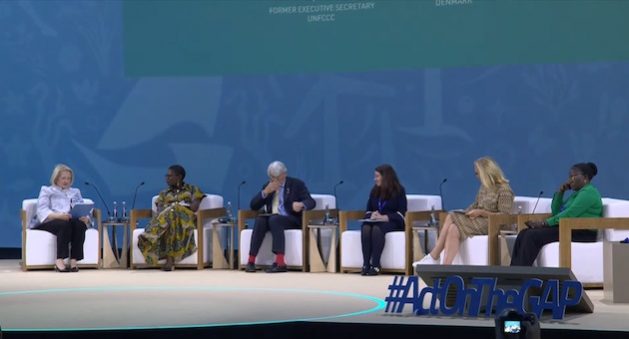
DUBAI, Dec 05 (IPS) – Women bear the brunt of the climate crisis, and inclusion at both the highest level and in the community is key to mitigating its impact. Today, the announcement of the COP28 Gender Responsive Just Transitions and Climate Action Partnership put women at the centre of climate solutions—with a collective endorsement that symbolized a paradigm shift in global commitment.
Gender Equality Day at COP28 saw ministers and high-level officials convene for a high-level dialogue to advance gender-responsive just transitions to support the implementation of the Paris Agreement. During the event that Razan Khalifa Al Mubarak, a UN Climate Change High-Level Champion, was leading, the COP28 Presidency announced the new partnership.
During the panel discussions on its importance, in which many distinguished world leaders participated, Dr Jeanne d’Arc Mujawamariya, Minister of Environment for the Republic of Rwanda, painted a poignant picture of the intersectionality between climate change and gender. She emphasized the requirement of the Paris Agreement to create high-quality jobs.
“The harsh reality is that women, constituting the majority of humanity, bear the brunt of climate change impacts. There are dire consequences of climate change being faced by my own country, Rwanda, grappling with floods and untimely rains, rendering streets impassable and schools inaccessible,” Mujawamariya told the conference.
The Minister underscored the urgent need to build a resilient future for women, urging investments in education, decision-making positions, and gender-responsive financial mechanisms.
“When a woman is a victim, the entire family suffers,” she added.
Sigrid Kaag, the Minister of Finance for the Netherlands, asserted that the catalyst for genuine change lay in anchoring climate action and gender-responsive budgeting. Kaag made it unequivocally clear that this was not merely an environmental concern but a matter of fundamental rights, underscoring the gravity of the agenda at hand.
Mayor Yvonne Aki-Sawyer, the co-chair of C40 cities, brought the municipal lens into the discourse. Speaking on behalf of nearly 100 cities, she expressed the collective engagement of mayors in the lives of their residents, over 50 percent of whom were female. Aki-Sawyer detailed the Women for Climate initiative, a testament to the proactive involvement of women in finding solutions to climate challenges. However, she acknowledged the systemic hurdles, emphasizing the need for dedicated spaces and resources to enable women to develop and implement these solutions.
Andrew Mitchell, the Minister of State in the United Kingdom’s Foreign Commonwealth and Development Office, injected an international development imperative into the dialogue.
“It is vital that we promote gender equality to ensure that this is a just and effective transition. We know that when women participate in the management of natural resources, it results in better governance and conservation, and when they are better represented in national parliaments, tougher climate change policies tend to be adopted. The evidence is clear, yet women are not given the chance to play their part. Women suffer disproportionately from climate change and conflict,” Andrew said. His call to endorse the gender-responsive pledge served as a rallying cry to collectively ascend the metaphorical mountain of challenges that lay ahead.
Celeste Drake, Deputy Director General of the International Labour Organization (ILO), took the stage, weaving a narrative around the ILO’s birth from conflict and its steadfast commitment to social justice.
Drake elucidated the profound impact of climate change on women and work, projecting statistics that forewarned of substantial job losses due to heat stress.
“ILO estimates that by 2030, more than 2 percent of the total working time will be lost because of heat stress. It is equivalent to 80 million full-time jobs. We need to create more inclusive jobs for our women and girls. The ILO estimates that effective climate policies could create, by 2035, about 12 million jobs in Nigeria and 50 million jobs in America.
But the question is, will those jobs be available to men and women equally? Will these jobs be gender responsive?” Drake asked. Drake dissected the complexities of women’s compounded inequalities in the labor market, emphasizing the need for intentional, gender-responsive transitions. She called for dismantling barriers and proactively ensuring that women had active access to training, skilling, and reskilling.
IPS UN Bureau Report
Follow @IPSNewsUNBureau
Follow IPS News UN Bureau on Instagram
© Inter Press Service (2023) — All Rights ReservedOriginal source: Inter Press Service

